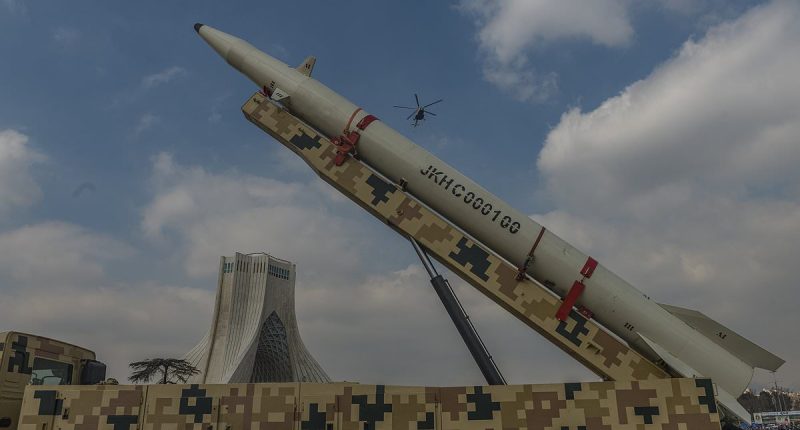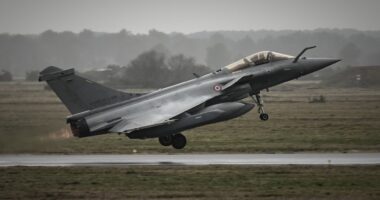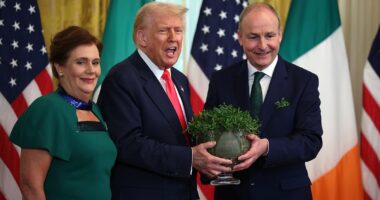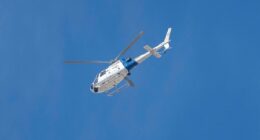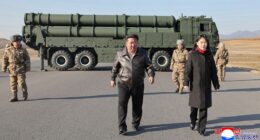Share this @internewscast.com

Iran is allegedly embarking upon a covert nuclear weapons development plan under the guise of building satellite-launching missiles, political opponents of the regime claimed today. Under the so-called ‘Kavir Plan’, Tehran is said to be intensifying efforts to acquire weapons with a range exceeding 3,000km (1,864 miles), despite ongoing talks to hash out a new nuclear accord and the lingering threat of a Western-backed resolution that would accuse Iran of violating its non-proliferation obligations.

The National Council of Resistance of Iran (NCRI) claimed on Tuesday to have uncovered evidence that the regime has designated the desert region in southern Semnan Province to developing and testing nuclear capabilities. The project is said to replace the AMAD Plan, which the UN’s nuclear watchdog – the International Atomic Energy Agency (IAEA) – said had ceased in operations in 2003.

For its part, Iran denies the existence of the AMAD Plan or any project aimed at acquiring nuclear weapons. Citing reports from within Iran, the NCRI claimed that Iran has ‘significantly enhanced’ its development programme since 2009 with a covert weapons plan at the behest of Supreme Leader Ali Khamenei. ‘The declared goal of ‘desert security’ has provided an effective cover for the Kavir Plan and enabled the regime to covertly pursue nuclear-related projects, tests, and associated activities in Semnan,’ a statement shared with MailOnline read.

‘Under the Kavir Plan, nuclear weapons development is conducted under the guise of manufacturing satellite-launching missiles. According to this plan, the power of the nuclear weapon was boosted, and the range of missiles carrying the warhead was enhanced.’ Since December, the NCRI has revealed four sites it says are associated with the Kavir Plan.

In May, the group shared satellite images it said showed a previously undisclosed Iranian nuclear weapons facility in Semnan Province. In April, Iranian Foreign Minister Abbas Araghchi dismissed ‘more Very Scary Satellite Images’, suggesting their circulation was politically motivated, intended to coincide with resuming Iran-US indirect nuclear talks.

He also accused Israel and allied groups of trying to sabotage talks through a ‘variety of tactics’, sharing an image of a satellite photo with a cartoon ghost labelled ‘SCARY’. The NCRI, which is banned in Iran, insists the desert sites are bona fide. They claim that operations are headquartered in Tehran, with multiple sites involved in developing and testing solid and liquid fuel weapons. The organisation, a political coalition based in Paris and calling to overthrow the Islamic Republic of Iran, reports that the regime has declared the Semnan Province a military zone in an effort to conceal its alleged operations.

They cite a network of supportive sources within Iran collecting reports, assembled by the NCRI’s Defense and Strategic Research Committee. Reconnaissance aircraft and drones have allegedly been sighted over the compounds. Individuals approaching the secretive sites are said to be identified with facial recognition cameras mounted on drones. American and European tourists to the areas have ‘consistently’ faced arrest and been subjected to interrogation, the NCRI claims. The Islamic Revolutionary Guard Corps (IRGC) set up an intelligence base in 2010 to gather intelligence in the area and maintain security over the region, the report claims.

The NCRI called for a multi-part international response, including reinstating all UN Security Council resolutions related to the regime’s nuclear programme; the reimposition of all sanctions; the permanent dismantling of uranium enrichment; IAEA verification of sites being dismantled and shut down; the elimination of the missile programme; and the opening of all nuclear sites to snap inspections. Only yesterday, Rafael Grossi, Director-General of the IAEA, warned that Iran’s growing stockpile of highly enriched uranium and unresolved questions about its programme remain serious issues. ‘Unless and until Iran assists the agency in resolving the outstanding safeguards issues, the Agency will not be in a position to provide assurance that Iran’s nuclear programme is exclusively peaceful,’ he said.

At the end of May, the IAEA published a damning report that claimed Iran had carried out secret nuclear activities with material not declared to the U.N. nuclear watchdog at three locations long under investigation. The findings in the ‘comprehensive’ International Atomic Energy Agency report requested by the agency’s 35-nation Board of Governors in November paved the way for a push by the United States, Britain, France and Germany for the board to declare Iran in violation of its non-proliferation obligations. Using the IAEA report’s findings, the four Western powers planned to submit a draft resolution for the board to adopt at its next meeting – this week. It would be the first time in almost 20 years Iran has formally been found in non-compliance.

Iran’s top negotiator, Foreign Minister Abbas Araghchi, today reiterated criticism of the plans to adopt a resolution that would accuse Tehran of non-compliance. ‘Any ill-considered and destructive decision in the Board of Governors against Iran will be met with an appropriate response,’ Araghchi said during a phone call with Japanese Foreign Minister Takeshi Iwaya. Iran has said it would reduce cooperation with the IAEA if the resolution passed. With a more encouraging tone, Iran did announce today that the sixth round of Iran-US nuclear talks was planned for this coming Sunday, with the two sides apparently locked in a standoff over uranium enrichment – nearly two months into the high-stakes negotiations.

Iran had said on Monday that it would present a counter-proposal on a nuclear deal with the United States, after it had described Washington’s offer as containing ‘ambiguities’. Iran’s parliament speaker has also said the US proposal failed to include the lifting of sanctions – a key demand for Tehran, which has been reeling under their weight for years. Tehran and Washington have held five rounds of talks since April to thrash out a new nuclear accord to replace the deal with major powers that US President Donald Trump abandoned during his first term in 2018.

Iran and the US have been locked in a diplomatic standoff over Iran’s uranium enrichment, with Tehran defending it as a ‘non-negotiable’ right and Washington describing it as a ‘red line’. The talks represent the highest level contact since Trump withdrew Washington from a 2015 nuclear accord, during his first term. Iran currently enriches uranium to 60 percent, far above the 3.67-percent limit set in the 2015 deal and close though still short of the 90 percent needed for a nuclear warhead.

Western countries, including the United States and its ally Israel, have long accused Iran of seeking to acquire atomic weapons, while Tehran insists its nuclear programme is for peaceful purposes. On Monday, the IAEA began a Board of Governors meeting in Vienna that will last until Friday to discuss Iran’s atomic activities and other issues. It had previously criticised ‘less than satisfactory’ cooperation from Tehran, particularly in explaining past cases of nuclear material found at undeclared sites. Iran has criticised the IAEA’s report as unbalanced, saying it relied on ‘forged documents’ provided by its arch foe Israel. Israel is believed to have nuclear weapons already.
